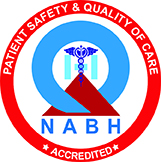High blood pressure, also known as hypertension, is often described as a “silent killer.” It develops gradually and without clear warning signs, yet its long-term effects on the heart and blood vessels can be severe if not managed in time. According to the World Health Organization (WHO), one in every four adults in India suffers from hypertension. This makes awareness, early diagnosis, and proactive treatment critical in preventing life-threatening complications.
How High Blood Pressure Affects the Heart
When blood pressure remains elevated, the heart is forced to pump blood with greater effort. Over time, this constant strain begins to damage the heart and its supporting vessels, setting the stage for serious health concerns:
- Thickened heart muscle (left ventricular hypertrophy): As the heart works harder, its walls become thicker, which reduces efficiency and increases the risk of heart failure.
- Coronary artery disease: High blood pressure injures the delicate inner lining of arteries, encouraging plaque buildup and narrowing of blood vessels.
- Heart attack and stroke: Narrowed or weakened arteries can become blocked or rupture, cutting off blood supply to the heart or brain.
- Heart failure: Years of overexertion eventually weaken the heart muscle, making it incapable of pumping blood effectively.
This gradual but relentless damage emphasizes why controlling blood pressure early is vital for long-term heart health.
Warning Signs You Shouldn’t Ignore
Although high blood pressure itself is often symptomless, the body eventually shows distress signals when the heart is under strain. Warning signs may include:
- Persistent chest pain or tightness
- Shortness of breath, even during rest
- Irregular heartbeat or palpitations
- Fatigue and frequent dizziness
- Swelling of feet, ankles, or legs
These symptoms, no matter how mild, should never be ignored. They may indicate that hypertension is already impacting the heart.
Protecting Your Heart – Steps That Matter
The good news is that hypertension-related complications can be largely prevented with timely intervention and consistent lifestyle changes. Here are some key steps:
- Monitor blood pressure regularly: Home monitoring or routine check-ups can help detect rising blood pressure before it becomes harmful.
- Adopt a heart-healthy diet: Prioritize fruits, vegetables, whole grains, and lean proteins, while cutting down on processed foods and excess salt.
- Stay physically active: At least 30 minutes of moderate exercise—such as walking, cycling, or yoga—strengthens cardiovascular function.
- Maintain a healthy weight: Even a small amount of weight loss can ease blood pressure and reduce strain on the heart.
- Quit smoking and limit alcohol: Both significantly raise blood pressure and directly damage the cardiovascular system.
- Manage stress effectively: Relaxation techniques like meditation, yoga, or breathing exercises can help regulate blood pressure naturally.
Conclusion
Hypertension may not cause obvious discomfort in its early stages, but its impact on the heart can be devastating if overlooked. With so many Indian adults already living with high blood pressure, awareness and preventive care are more crucial than ever. By embracing healthy lifestyle habits, keeping a close check on blood pressure, and seeking medical guidance promptly, people can protect their hearts and live longer, healthier lives.
Doctor’s Note
“High blood pressure does not announce itself loudly, but its consequences on the heart can be life-altering. The key is early detection and disciplined management. Small lifestyle changes—regular exercise, balanced diet, stress control—can make a big difference. Remember, protecting your heart is not just about treating disease, it’s about preventing it. At Silver Streak Hospital, our goal is to empower every patient to take charge of their heart health before complications arise.”
Read Dr. Nitin Article Also at TV9 English: https://www.tv9english.com/lifestyle/cardiologist-explains-know-the-consequences-of-leaving-high-bp-untreated-article-10876881.html


